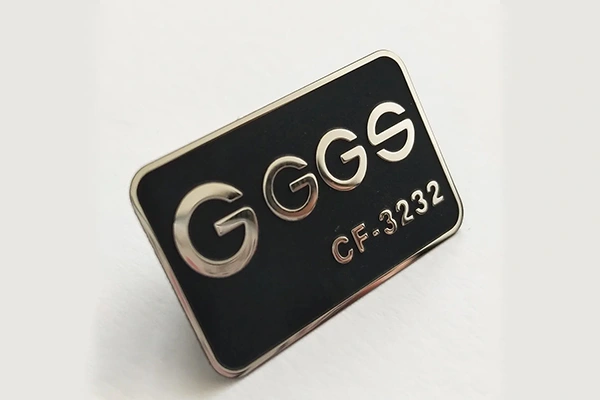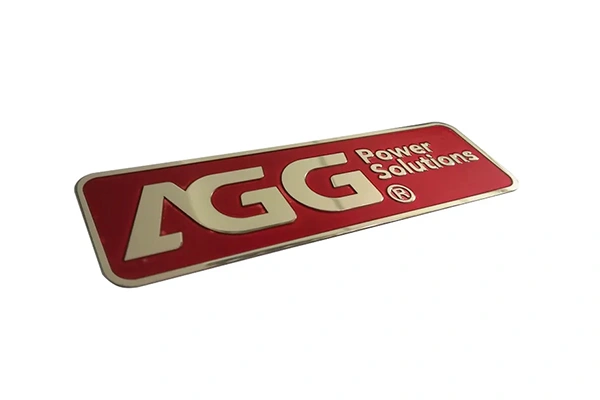Himgo delivers high-quality, cost-effective metal nameplates for you.
In today’s competitive market, product identification is more than just a matter of convenience—it’s essential. Metal labels are a critical tool for branding, ensuring product recognition, and meeting legal and safety standards across various industries. Whether you’re working in electronics, automotive, or luxury goods, metal labels offer unmatched durability and versatility, ensuring your products are easily identified and compliant with industry regulations.

The Role of Metal Labels in Branding and Product Identification
Metal labels are more than just functional tags—they serve as a key component in building a brand’s identity and enhancing product recognition. These durable labels are not only practical but also contribute significantly to a product’s market presence.
What Are Metal Labels?
Metal labels are typically made from materials such as aluminum, stainless steel, or brass. Unlike paper or plastic labels, they are designed to withstand harsh environments and are ideal for use in industries where durability and long-term performance are critical.
ASM International. (2025, October 16). Home – ASM International.
Branding and Recognition
Metal labels play a vital role in product branding. By offering a premium, polished appearance, they enhance the overall brand image, conveying quality and reliability to customers. Whether it’s through custom designs, logos, or engraved details, these labels help reinforce the brand identity, making it easier for consumers to identify and trust the product.
Benefits Over Other Materials
When compared to paper or plastic labels, metal labels excel in terms of durability. Their ability to resist environmental wear, scratches, fading, and exposure to extreme temperatures ensures that your brand and product remain visible and legible for a long time.

Benefits of Metal Labels for Durability and Longevity
Durability and longevity are the two primary reasons why industries prefer metal labels. Unlike paper or plastic labels that can fade or peel over time, metal labels provide long-lasting identification even in the harshest conditions.
Longevity vs. Paper/Plastic Labels
Metal labels can last for decades, while paper and plastic labels may degrade within months or even weeks, especially in high-exposure environments. This is particularly important in industries like automotive and industrial machinery, where equipment is exposed to heat, moisture, and abrasion.
Resistance to Environmental Factors
One of the key benefits of metal labels is their resistance to extreme environmental factors such as:
High temperatures: Metal labels can withstand high-heat environments, making them ideal for automotive, industrial, and aerospace applications.
Moisture: These labels remain intact and legible even in wet or humid conditions, which is critical for electronics and marine industries.
Wear and tear: Metal labels are resistant to scratching and fading, which makes them perfect for products subjected to frequent handling or outdoor exposure.
Industry Case Studies
For example, in the automotive industry, metal labels are essential for product identification of parts exposed to high temperatures and mechanical stress. Similarly, in electronics, metal labels ensure safety compliance and longevity, even in high-stress environments.

How Custom Metal Labels Support Compliance and Industry Standards
In many industries, compliance with safety and regulatory standards is non-negotiable. Custom metal labels play an important role in meeting these requirements and ensuring your products are legally compliant.(EU REACH Regulation – European Commission)
Regulatory Requirements
Industries such as electronics, automotive, and manufacturing require labels that meet specific regulations. For instance, CE markings, UL certifications, and safety instructions must be clearly visible and durable. Metal labels can be customized to display these necessary compliance markers while also maintaining a high level of durability.
Customization for Compliance
Custom metal tags can be tailored to meet the exact needs of your industry. Whether it’s adding specific regulatory symbols, serial numbers, or compliance certifications, custom metal labels ensure that your product complies with legal standards without compromising on brand aesthetics.
Avoiding Legal Issues
Using durable and properly customized metal labels can help businesses avoid costly legal issues by ensuring products meet all regulatory and safety standards. In industries like automotive and electronics, failure to meet compliance standards can result in fines or product recalls, making the use of high-quality metal labels crucial.

The Versatility of Metal Labels Across Different Industries
Metal labels are not one-size-fits-all. Their versatility makes them ideal for use across a wide range of industries, from electronics to automotive to luxury goods.
Industry Applications
Automotive: In the automotive industry, metal labels are used for tracking parts, marking engines, and ensuring compliance with safety standards. They help identify and authenticate products, which is critical in a highly regulated industry.
Electronics: For electronics, metal labels provide important safety information and help in brand identification. Given the harsh environments these products may face, metal labels stand up to high temperatures and constant handling.
Luxury Goods: In the luxury sector, metal labels serve as a mark of premium quality. Custom metal tags are used to distinguish high-end products and add an extra level of sophistication to branding.
Advantages in Extreme Conditions
Metal labels are particularly advantageous in industries with extreme conditions—whether that’s exposure to high temperatures in the automotive industry or extreme wear and tear in industrial applications. Their resistance to environmental factors makes them indispensable in these sectors.
How to Choose the Right Metal Label for Your Product
Selecting the right metal label for your product is essential for ensuring durability, compliance, and brand integrity. Several factors need to be considered when choosing the best metal label for your needs.
Factors to Consider
Material: Depending on your product’s requirements, the choice of metal—whether it’s aluminum, stainless steel, or brass—will affect the label’s performance.(ISO 14721: Space Systems – Metal Labeling Standards)
Thickness: Thicker metal labels provide extra durability but may not be suitable for all applications, especially if weight is a concern.
Surface Finish: Choose between brushed, polished, or matte finishes based on the desired appearance and durability.
Design: Consider how intricate the design needs to be—laser engraving, printing, or embossing may all be viable options depending on your branding needs.
Types of Metal
Aluminum: Lightweight and cost-effective, often used for less demanding environments.
Stainless Steel: Offers superior corrosion resistance, ideal for harsh environments.
Brass: Provides a premium look and feel, typically used in high-end products or luxury branding.
Customization Options
From engraving to printing to embossing, customizing your metal labels is an excellent way to enhance your product’s identity and ensure it meets both aesthetic and functional requirements.

Cost vs. Quality: Investing in Metal Labels for Long-Term Savings
Though metal labels may require a higher upfront investment compared to paper or plastic alternatives, their long-term benefits often outweigh the initial cost.
Cost Considerations
When considering the costs of metal labels, it’s important to factor in the long-term savings. (MarketsandMarkets – Metal Labels Market Forecast)While cheaper alternatives may seem appealing initially, they often fail in the long run due to fading, wear, or peeling. Investing in quality metal labels can reduce the need for frequent replacements, saving you money over time.
Cost-Benefit Analysis
Durability: Metal labels last significantly longer, meaning fewer replacements and lower overall costs.
Brand Value: Investing in premium materials like metal elevates the product’s perceived value, which can justify a higher price point.
Safety and Compliance: Proper labeling can help avoid fines and legal issues, which can be far more expensive than the initial investment in high-quality metal labels.




